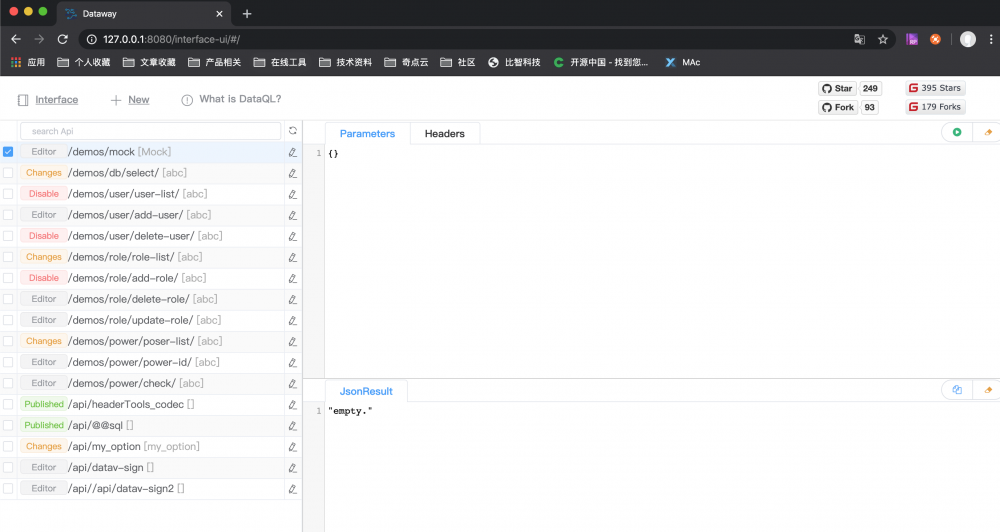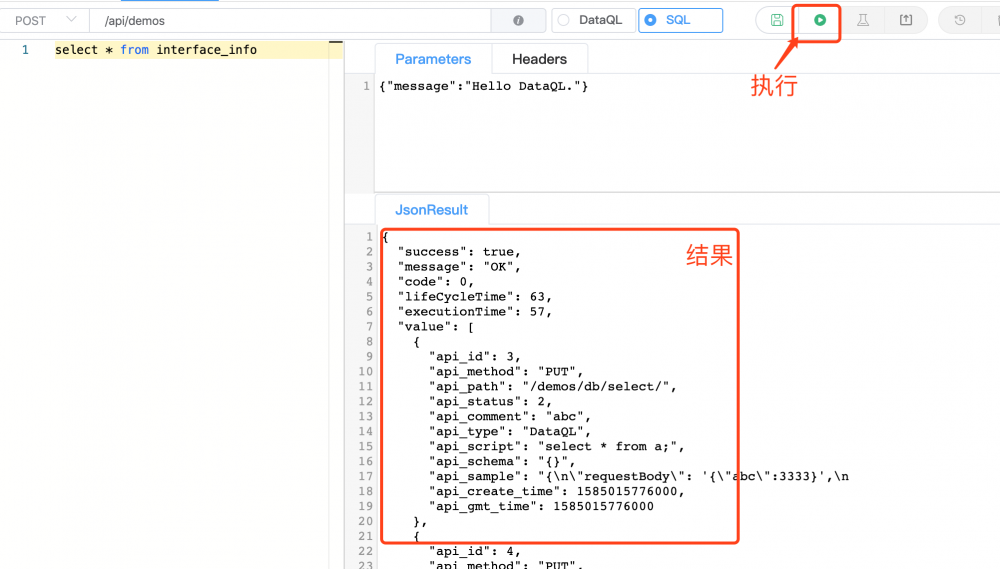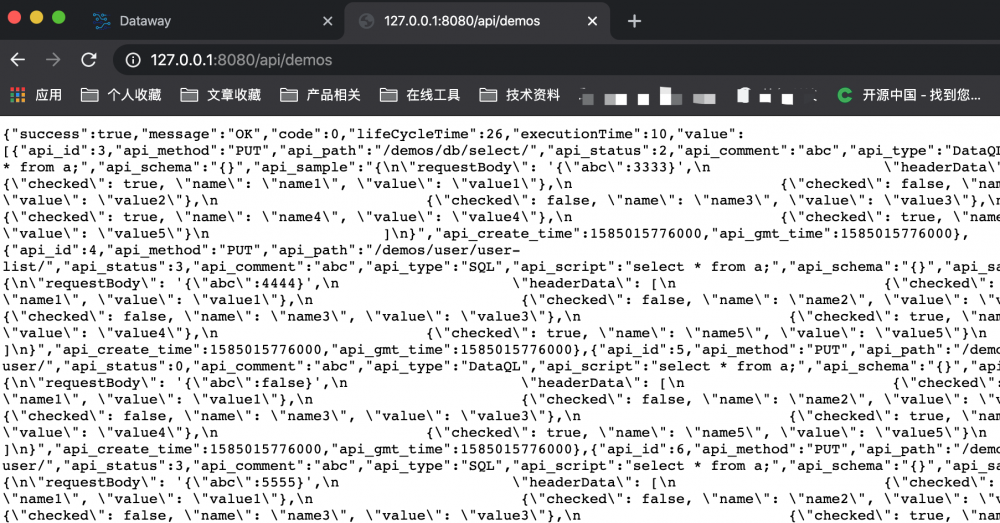在 Spring Boot 中使用 Dataway 配置数据查询接口 原 荐
Dataway介绍
Dataway 是基于 DataQL 服务聚合能力,为应用提供的一个接口配置工具。使得使用者无需开发任何代码就配置一个满足需求的接口。 整个接口配置、测试、冒烟、发布。一站式都通过 Dataway 提供的 UI 界面完成。UI 会以 Jar 包方式提供并集成到应用中并和应用共享同一个 http 端口,应用无需单独为 Dataway 开辟新的管理端口。
这种内嵌集成方式模式的优点是,可以使得大部分老项目都可以在无侵入的情况下直接应用 Dataway。进而改进老项目的迭代效率,大大减少企业项目研发成本。
Dataway 工具化的提供 DataQL 配置能力。这种研发模式的变革使得,相当多的需求开发场景只需要配置即可完成交付。 从而避免了从数据存取到前端接口之间的一系列开发任务,例如:Mapper、BO、VO、DO、DAO、Service、Controller 统统不在需要。
Dataway 是 Hasor 生态中的一员,因此在 Spring 中使用 Dataway 首先要做的就是打通两个生态。根据官方文档中推荐的方式我们将 Hasor 和 Spring Boot 整合起来。这里是原文: https://www.hasor.net/web/extends/spring/for_boot.html
第一步:引入相关依赖
<dependency>
<groupId>net.hasor</groupId>
<artifactId>hasor-spring</artifactId>
<version>4.1.3</version>
</dependency>
<dependency>
<groupId>net.hasor</groupId>
<artifactId>hasor-dataway</artifactId>
<version>4.1.3-fix20200414</version><!-- 4.1.3 包存在UI资源缺失问题 -->
</dependency>
hasor-spring 负责 Spring 和 Hasor 框架之间的整合。
hasor-dataway 是工作在 Hasor 之上,利用 hasor-spring 我们就可以使用 dataway了。
第二步:配置 Dataway,并初始化数据表
dataway 会提供一个界面让我们配置接口,这一点类似 Swagger 只要jar包集成就可以实现接口配置。找到我们 springboot 项目的配置文件 application.properties
# 是否启用 Dataway 功能(必选:默认false) HASOR_DATAQL_DATAWAY=true # 是否开启 Dataway 后台管理界面(必选:默认false) HASOR_DATAQL_DATAWAY_ADMIN=true # dataway API工作路径(可选,默认:/api/) HASOR_DATAQL_DATAWAY_API_URL=/api/ # dataway-ui 的工作路径(可选,默认:/interface-ui/) HASOR_DATAQL_DATAWAY_UI_URL=/interface-ui/ # SQL执行器方言设置(可选,建议设置) HASOR_DATAQL_FX_PAGE_DIALECT=mysql
Dataway 一共涉及到 5个可以配置的配置项,但不是所有配置都是必须的。
其中 HASOR_DATAQL_DATAWAY 、 HASOR_DATAQL_DATAWAY_ADMIN 两个配置是必须要打开的,默认情况下 Datawaty 是不启用的。
Dataway 需要两个数据表才能工作,下面是这两个数据表的简表语句。下面这个 SQL 可以在 dataway的依赖 jar 包中 “META-INF/hasor-framework/mysql” 目录下面找到,建表语句是用 mysql 语法写的。
CREATE TABLE `interface_info` (
`api_id` int(11) NOT NULL AUTO_INCREMENT COMMENT 'ID',
`api_method` varchar(12) NOT NULL COMMENT 'HttpMethod:GET、PUT、POST',
`api_path` varchar(512) NOT NULL COMMENT '拦截路径',
`api_status` int(2) NOT NULL COMMENT '状态:0草稿,1发布,2有变更,3禁用',
`api_comment` varchar(255) NULL COMMENT '注释',
`api_type` varchar(24) NOT NULL COMMENT '脚本类型:SQL、DataQL',
`api_script` mediumtext NOT NULL COMMENT '查询脚本:xxxxxxx',
`api_schema` mediumtext NULL COMMENT '接口的请求/响应数据结构',
`api_sample` mediumtext NULL COMMENT '请求/响应/请求头样本数据',
`api_create_time` datetime DEFAULT CURRENT_TIMESTAMP COMMENT '创建时间',
`api_gmt_time` datetime DEFAULT CURRENT_TIMESTAMP COMMENT '修改时间',
PRIMARY KEY (`api_id`)
) ENGINE=InnoDB AUTO_INCREMENT=0 DEFAULT CHARSET=utf8mb4 COMMENT='Dataway 中的API';
CREATE TABLE `interface_release` (
`pub_id` int(11) NOT NULL AUTO_INCREMENT COMMENT 'Publish ID',
`pub_api_id` int(11) NOT NULL COMMENT '所属API ID',
`pub_method` varchar(12) NOT NULL COMMENT 'HttpMethod:GET、PUT、POST',
`pub_path` varchar(512) NOT NULL COMMENT '拦截路径',
`pub_status` int(2) NOT NULL COMMENT '状态:0有效,1无效(可能被下线)',
`pub_type` varchar(24) NOT NULL COMMENT '脚本类型:SQL、DataQL',
`pub_script` mediumtext NOT NULL COMMENT '查询脚本:xxxxxxx',
`pub_script_ori` mediumtext NOT NULL COMMENT '原始查询脚本,仅当类型为SQL时不同',
`pub_schema` mediumtext NULL COMMENT '接口的请求/响应数据结构',
`pub_sample` mediumtext NULL COMMENT '请求/响应/请求头样本数据',
`pub_release_time`datetime DEFAULT CURRENT_TIMESTAMP COMMENT '发布时间(下线不更新)',
PRIMARY KEY (`pub_id`)
) ENGINE=InnoDB AUTO_INCREMENT=0 DEFAULT CHARSET=utf8mb4 COMMENT='Dataway API 发布历史。';
create index idx_interface_release on interface_release (pub_api_id);
第三步:配置数据源
作为 Spring Boot 项目有着自己完善的数据库方面工具支持。我们这次采用 druid + mysql + spring-boot-starter-jdbc 的方式。
首先引入依赖
<dependency>
<groupId>mysql</groupId>
<artifactId>mysql-connector-java</artifactId>
<version>5.1.30</version>
</dependency>
<dependency>
<groupId>com.alibaba</groupId>
<artifactId>druid</artifactId>
<version>1.1.21</version>
</dependency>
<dependency>
<groupId>org.springframework.boot</groupId>
<artifactId>spring-boot-starter-jdbc</artifactId>
</dependency>
<dependency>
<groupId>com.alibaba</groupId>
<artifactId>druid-spring-boot-starter</artifactId>
<version>1.1.10</version>
</dependency>
然后增加数据源的配置
# db spring.datasource.url=jdbc:mysql://xxxxxxx:3306/example spring.datasource.username=xxxxx spring.datasource.password=xxxxx spring.datasource.driver-class-name=com.mysql.jdbc.Driver spring.datasource.type:com.alibaba.druid.pool.DruidDataSource # druid spring.datasource.druid.initial-size=3 spring.datasource.druid.min-idle=3 spring.datasource.druid.max-active=10 spring.datasource.druid.max-wait=60000 spring.datasource.druid.stat-view-servlet.login-username=admin spring.datasource.druid.stat-view-servlet.login-password=admin spring.datasource.druid.filter.stat.log-slow-sql=true spring.datasource.druid.filter.stat.slow-sql-millis=1
如果项目已经集成了自己的数据源,那么可以忽略第三步。
第四步:把数据源设置到 Hasor 容器中
Spring Boot 和 Hasor 本是两个独立的容器框架,我们做整合之后为了使用 Dataway 的能力需要把 Spring 中的数据源设置到 Hasor 中。
首先新建一个 Hasor 的 模块,并且将其交给 Spring 管理。然后把数据源通过 Spring 注入进来。
@DimModule
@Component
public class ExampleModule implements SpringModule {
@Autowired
private DataSource dataSource = null;
@Override
public void loadModule(ApiBinder apiBinder) throws Throwable {
// .DataSource form Spring boot into Hasor
apiBinder.installModule(new JdbcModule(Level.Full, this.dataSource));
}
}
Hasor 启动的时候会调用 loadModule 方法,在这里再把 DataSource 设置到 Hasor 中。
第五步:在SprintBoot 中启用 Hasor
@EnableHasor()
@EnableHasorWeb()
@SpringBootApplication(scanBasePackages = { "net.example.hasor" })
public class ExampleApplication {
public static void main(String[] args) {
SpringApplication.run(ExampleApplication.class, args);
}
}
这一步非常简单,只需要在 Spring 启动类上增加两个注解即可。
第六步:启动应用
应用在启动过程中会看到 Hasor Boot 的欢迎信息
_ _ ____ _ | | | | | _ / | | | |__| | __ _ ___ ___ _ __ | |_) | ___ ___ | |_ | __ |/ _` / __|/ _ /| '__| | _ < / _ / / _ /| __| | | | | (_| /__ / (_) | | | |_) | (_) | (_) | |_ |_| |_|/__,_|___//___/|_| |____/ /___/ /___/ /__|
在后面的日志中还可以看到类似下面这些日志。
2020-04-14 13:52:59.696 [main] INFO n.h.core.context.TemplateAppContext - loadModule class net.hasor.dataway.config.DatawayModule 2020-04-14 13:52:59.697 [main] INFO n.hasor.dataway.config.DatawayModule - dataway api workAt /api/ 2020-04-14 13:52:59.697 [main] INFO n.h.c.e.AbstractEnvironment - var -> HASOR_DATAQL_DATAWAY_API_URL = /api/. 2020-04-14 13:52:59.704 [main] INFO n.hasor.dataway.config.DatawayModule - dataway admin workAt /interface-ui/ 2020-04-14 13:52:59.716 [main] INFO net.hasor.core.binder.ApiBinderWrap - mapingTo[901d38f22faa419a8593bb349905ed0e] -> bindType ‘class net.hasor.dataway.web.ApiDetailController’ mappingTo: ‘[/interface-ui/api/api-detail]’. 2020-04-14 13:52:59.716 [main] INFO net.hasor.core.binder.ApiBinderWrap - mapingTo[c6eb9f3b3d4c4c8d8a4f807435538172] -> bindType ‘class net.hasor.dataway.web.ApiHistoryListController’ mappingTo: ‘[/interface-ui/api/api-history]’. 2020-04-14 13:52:59.717 [main] INFO net.hasor.core.binder.ApiBinderWrap - mapingTo[eb841dc72ad54023957233ef602c4327] -> bindType ‘class net.hasor.dataway.web.ApiInfoController’ mappingTo: ‘[/interface-ui/api/api-info]’. 2020-04-14 13:52:59.717 [main] INFO net.hasor.core.binder.ApiBinderWrap - mapingTo[96aebb46265245459ae21d558e530921] -> bindType ‘class net.hasor.dataway.web.ApiListController’ mappingTo: ‘[/interface-ui/api/api-list]’. 2020-04-14 13:52:59.718 [main] INFO net.hasor.core.binder.ApiBinderWrap - mapingTo[7467c07f160244df8f228321f6262d3d] -> bindType ‘class net.hasor.dataway.web.ApiHistoryGetController’ mappingTo: ‘[/interface-ui/api/get-history]’. 2020-04-14 13:52:59.719 [main] INFO net.hasor.core.binder.ApiBinderWrap - mapingTo[97d8da5363c741ba99d87c073a344412] -> bindType ‘class net.hasor.dataway.web.DisableController’ mappingTo: ‘[/interface-ui/api/disable]’. 2020-04-14 13:52:59.720 [main] INFO net.hasor.core.binder.ApiBinderWrap - mapingTo[8ddc3316ef2642dfa4395ca8ac0fff04] -> bindType ‘class net.hasor.dataway.web.SmokeController’ mappingTo: ‘[/interface-ui/api/smoke]’. 2020-04-14 13:52:59.720 [main] INFO net.hasor.core.binder.ApiBinderWrap - mapingTo[cc06c5fb343b471aacedc58fb2fe7bf8] -> bindType ‘class net.hasor.dataway.web.SaveApiController’ mappingTo: ‘[/interface-ui/api/save-api]’. 2020-04-14 13:52:59.720 [main] INFO net.hasor.core.binder.ApiBinderWrap - mapingTo[7915b2b1f89a4e73891edab0264c9bd4] -> bindType ‘class net.hasor.dataway.web.PublishController’ mappingTo: ‘[/interface-ui/api/publish]’. 2020-04-14 13:52:59.721 [main] INFO net.hasor.core.binder.ApiBinderWrap - mapingTo[0cfa34586455414591bdc389bff23ccb] -> bindType ‘class net.hasor.dataway.web.PerformController’ mappingTo: ‘[/interface-ui/api/perform]’. 2020-04-14 13:52:59.721 [main] INFO net.hasor.core.binder.ApiBinderWrap - mapingTo[37fe4af3e2994acb8deb72d21f02217c] -> bindType ‘class net.hasor.dataway.web.DeleteController’ mappingTo: ‘[/interface-ui/api/delete]’.
当看到 “dataway api workAt /api/ ” 、 dataway admin workAt /interface-ui/ 信息时,就可以确定 Dataway 的配置已经生效了。
第七步:访问接口管理页面进行接口配置
在浏览器中输入 “http://127.0.0.1:8080/interface-ui/” 就可以看到期待已久的界面了。

第八步:新建一个接口
Dataway 提供了2中语言模式,我们可以使用强大的 DataQL 查询语言,也可以直接使用 SQL 语言(在 Dataway 内部 SQL 语言也会被转换为 DataQL 的形式执行。)

首先我们在 SQL 模式下尝试执行一条 select 查询,立刻就可以看到这条 SQL 的查询结果。

同样的方式我们使用 DataQL 的方式需要这样写:
var query = @@sql()<%
select * from interface_info
%>
return query()
其中 var query = @@sql()<% ... %> 是用来定义SQL外部代码块,并将这个定义存入 query 变量名中。 <% %> 中间的就是 SQL 语句。
最后在 DataQL 中调用这个代码块,并返回查询结果。
当接口写好之后就可以保存发布了,为了测试方便,我选用 GET 方式。

接口发布之后我们直接请求: http://127.0.0.1:8080/api/demos ,就看到期待已久的接口返回值了。

最后总结
经过上面的几个步骤我们介绍了如何基于 Spring Boot 项目使用 Dataway 来简单的配置接口。Dataway 的方式确实给人耳目一新,一个接口竟然可以如此简单的配置出来无需开发任何一行代码,也不需要做任何 Mapping 实体映射绑定。
后面会有更多 Dataway 的文章推出也欢迎大家继续关注,大家在使用过程中遇到什么问题可以在评论区留言,或者加入 Hasor 线下交流群一起讨论(群号请到 Hasor 官网上查阅,这里就卖个关子)
最后放几个有用的连接:
- Dataway 官方手册: https://www.hasor.net/web/dataway/about.html
- Dataway 在 OSC 上的项目地址,欢迎收藏: https://www.oschina.net/p/dataway
- DataQL 手册地址: https://www.hasor.net/web/dataql/what_is_dataql.html
- Hasor 项目的首页: https://www.hasor.net/web/index.html
- 本文标签: sql 代码 key example Service JDBC 目录 db cat API Select schema 文章 springboot mysql 端口 数据库 管理 HTML dataSource ACE Spring Boot tab tar IDE App 线下 Word id 启动过程 数据 CTO 企业 http IO 测试 https UI 注释 总结 core SQL执行 web 配置 时间 开发 src mapper GMT java ip map 需求 list lib ORM druid spring servlet
- 版权声明: 本文为互联网转载文章,出处已在文章中说明(部分除外)。如果侵权,请联系本站长删除,谢谢。
- 本文海报: 生成海报一 生成海报二











![[HBLOG]公众号](https://www.liuhaihua.cn/img/qrcode_gzh.jpg)

